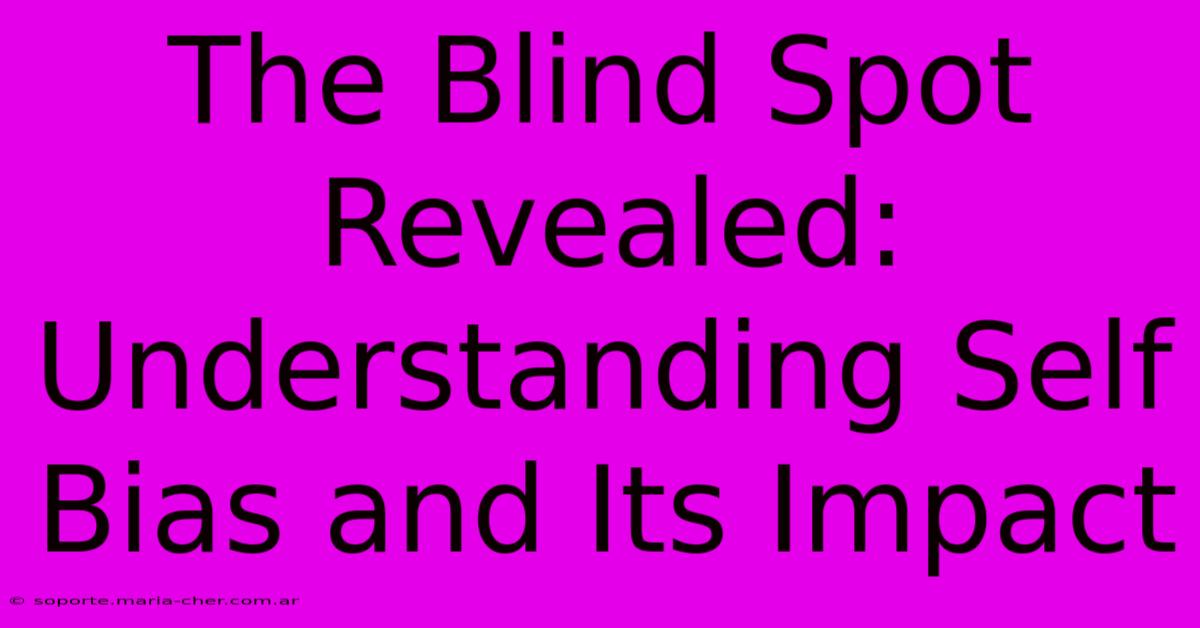The Blind Spot Revealed: Understanding Self Bias And Its Impact

Table of Contents
The Blind Spot Revealed: Understanding Self Bias and Its Impact
We all like to think of ourselves as objective, rational beings. But the reality is, we're constantly influenced by self-bias, those unconscious, often subtle, distortions in our thinking that favor ourselves. Understanding these biases is crucial for personal growth, improved relationships, and even professional success. This article delves into the fascinating world of self-bias, exploring its various forms and its significant impact on our lives.
What is Self-Bias?
Self-bias, also known as egocentric bias, is a cognitive bias that refers to the tendency to overestimate our own abilities, contributions, and positive qualities while downplaying our shortcomings. It's a natural human tendency, rooted in our inherent need for self-esteem and a positive self-image. However, while a healthy sense of self-worth is essential, unchecked self-bias can lead to significant problems.
Types of Self-Bias:
Several types of self-bias exist, each manifesting in different ways:
-
Illusory superiority: This is the belief that we are better than average in various aspects, from driving skills to intelligence. It's often seen in areas where objective measurement is difficult. Many people believe they're above-average drivers, even though statistically, this is impossible.
-
Self-serving bias: This involves attributing successes to our own abilities and efforts while blaming external factors for failures. For example, acing a test is due to our intelligence and hard work, but failing is because the test was unfair or poorly designed.
-
Optimism bias: This is the tendency to overestimate the likelihood of positive events happening to us and underestimate the probability of negative ones. While some optimism is healthy, excessive optimism can lead to poor decision-making and risk-taking.
-
Confirmation bias: This involves seeking out and interpreting information that confirms our existing beliefs while ignoring evidence that contradicts them. This can reinforce self-biased views and hinder objective judgment.
-
Dunning-Kruger effect: This fascinating phenomenon describes a situation where individuals with low ability in a particular area overestimate their competence, while highly competent individuals tend to underestimate their abilities. This highlights the difficulty in self-assessment.
The Impact of Self-Bias:
The consequences of unchecked self-bias can be far-reaching:
-
Damaged Relationships: Self-serving bias can lead to conflict in relationships as individuals struggle to accept responsibility for their mistakes. Illusory superiority can breed arrogance and alienate others.
-
Poor Decision-Making: Optimism bias and confirmation bias can lead to poor risk assessment and unrealistic expectations, ultimately resulting in poor choices.
-
Missed Opportunities for Growth: Failure to acknowledge shortcomings prevents us from learning and improving. Self-criticism, when balanced, is essential for personal growth.
-
Professional Setbacks: Overestimating our abilities can lead to taking on tasks we're not equipped for, resulting in missed deadlines, failed projects, and damaged professional reputation.
Overcoming Self-Bias:
While eliminating self-bias entirely is likely impossible, we can mitigate its negative effects through conscious effort:
-
Seek Feedback: Actively solicit feedback from trusted sources. Be open to constructive criticism, even if it's difficult to hear.
-
Practice Self-Reflection: Regularly reflect on your actions and decisions. Identify instances where self-bias might have influenced your choices.
-
Develop Self-Awareness: Pay attention to your thoughts and feelings. Recognize patterns of self-justification and avoidance of responsibility.
-
Embrace Failure: View failures as learning opportunities, not personal shortcomings. Analyze what went wrong and how to improve.
-
Consider Alternative Perspectives: Actively seek out different viewpoints and challenge your own assumptions.
Conclusion:
Self-bias is a pervasive human trait, but understanding its nature and impact is the first step towards mitigating its negative effects. By developing self-awareness, seeking feedback, and practicing self-reflection, we can cultivate a more realistic and objective view of ourselves and the world around us. This ultimately leads to stronger relationships, better decision-making, and greater personal fulfillment. The journey towards overcoming self-bias is ongoing, but the rewards are well worth the effort.

Thank you for visiting our website wich cover about The Blind Spot Revealed: Understanding Self Bias And Its Impact. We hope the information provided has been useful to you. Feel free to contact us if you have any questions or need further assistance. See you next time and dont miss to bookmark.
Featured Posts
-
Petal Perfect The Art Of Arranging Mothers Day Flowers For A Picture Worthy Moment
Feb 04, 2025
-
Art Meets Function The Ultimate Guide To Creating Custom Table Runners For Any Occasion
Feb 04, 2025
-
Breakthrough In Miniature Architecture Unleash Your Creativity With Builder In A Bottle
Feb 04, 2025
-
Unveiling The Secret Blacklist The Comprehensive Guide To Restricted Short Sale Stocks
Feb 04, 2025
-
Unleash Your Inner Goddess D And D Nail Polish Set That Will Make You Roll For Initiative
Feb 04, 2025
